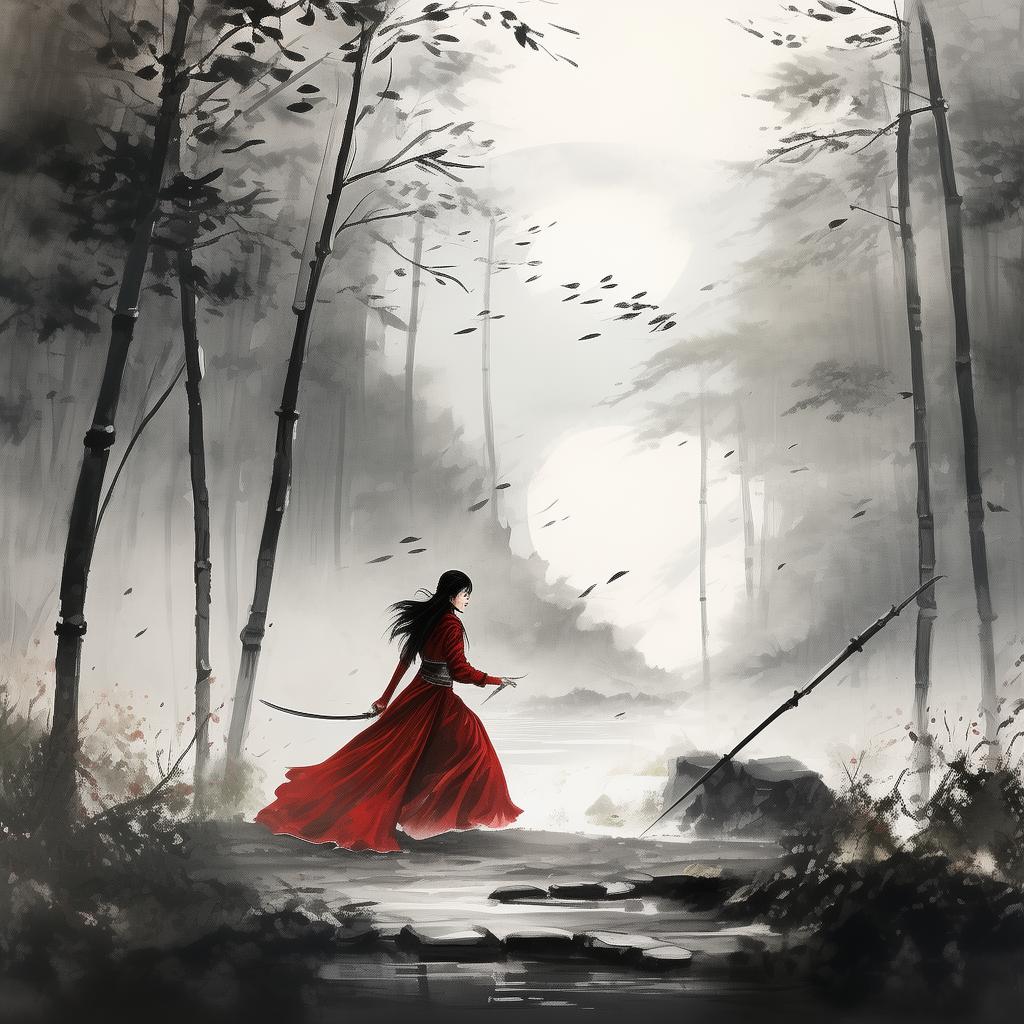The Monkess' Vengeance: Echoes of the Fallen Dream
In the secluded mountains of the Wudang region, a young woman named Mei had always been an enigma among the monks. Her eyes, a striking shade of amber, seemed to hold the wisdom of ages, while her movements, fluid and graceful, whispered tales of a life not lived. It was said that Mei had once been a dreamer, chasing the stars with the fervor of youth, until fate dealt her a heavy hand.
The Monkess' Lament A Martial Ballad of the Wounded Dreamer was the song that echoed through her mind, a haunting melody that told the tale of her lost love and the martial arts that had saved her from the brink of despair. It was a story of heartbreak and redemption, of a warrior's journey from innocence to the brink of darkness, and back again.
Mei had taken refuge in the monasteries of Wudang, seeking solace in the ancient disciplines of Kung Fu. Her days were spent in silent contemplation and rigorous training, her nights filled with dreams of the past and the promise of a future that seemed as unreachable as the clouds above. The monks, moved by her determination and the sorrow in her eyes, had taken her in, seeing in her a soul that had been scarred but not shattered.
One night, as the moon hung low in the sky, casting its silver glow over the temple grounds, Mei received a vision. The image of an old man, with a face etched with the lines of countless battles, appeared before her. "You must follow the path of the monkess," the man's voice was a rumble of thunder, "and bring justice to those who have wronged you."
The old man's name was Feng, a legendary warrior who had once walked the earth with the grace of a cloud and the strength of a mountain. His tale was spoken in whispers, a legend that had been passed down through generations of martial artists. Mei knew that this path was not one of revenge, but one of redemption, of understanding the true essence of martial arts beyond the mere practice of fighting.
Mei's journey began with the rediscovery of her own martial prowess. She trained tirelessly, her form becoming as fluid as a river, and her strikes as precise as a falling star. The monks, witnessing her transformation, whispered among themselves, "The dreamer has become a dream weaver."
As Mei's skills grew, so too did her understanding of the world around her. She learned that the path of the monkess was one of balance, of using her abilities to protect and heal, not just to harm. Yet, the vision of Feng remained, a beacon of justice that drew her ever closer to the truth of her past.
One fateful day, while Mei was out on a training mission, she encountered a band of bandits who had taken refuge in a hidden cave. Without hesitation, she moved to subdue them, her movements swift and deadly. In the midst of her battle, she heard a voice, echoing through the cave, "You think you are ready for this, Monkess?"
It was the bandit leader, a man with eyes like a storm, who had orchestrated the attack. He had heard of Mei's prowess and sought to test her limits. But as the battle raged on, Mei realized that this was not just a physical confrontation, but a test of her character and her resolve.
The fight ended with the bandits subdued, but not before Mei had been wounded. As she lay on the ground, bleeding and exhausted, she looked into the eyes of the bandit leader and found a glimmer of humanity. "Why?" she asked, her voice weak but determined.
"Because you remind me of my own past," the leader replied, "of a man who was once a dreamer, until his dreams were taken from him."
With those words, Mei understood. The path of the monkess was not one of blind vengeance, but of understanding and compassion. She had been chosen to bring balance to the world, not to seek retribution.

Returning to the temple, Mei shared her experience with Feng, who smiled softly. "You have learned well, Monkess," he said. "The true strength of the martial arts lies not in the ability to strike, but in the ability to understand."
And so, Mei's journey continued, not as a warrior seeking revenge, but as a monkess seeking balance. She learned that the martial arts were not just a form of combat, but a way of life, a path that led to enlightenment and inner peace.
In the end, the Monkess' Vengeance: Echoes of the Fallen Dream became more than a tale of a woman's quest for justice. It was a story of the power of forgiveness, the strength of the human spirit, and the enduring legacy of the martial arts, a legacy that would continue to inspire dreamers and warriors for generations to come.
✨ Original Statement ✨
All articles published on this website (including but not limited to text, images, videos, and other content) are original or authorized for reposting and are protected by relevant laws. Without the explicit written permission of this website, no individual or organization may copy, modify, repost, or use the content for commercial purposes.
If you need to quote or cooperate, please contact this site for authorization. We reserve the right to pursue legal responsibility for any unauthorized use.
Hereby declared.









